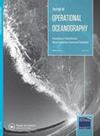模拟海洋垃圾漂移的策略
IF 2.4
3区 地球科学
Q4 METEOROLOGY & ATMOSPHERIC SCIENCES
引用次数: 26
摘要
模拟准实时的海洋垃圾漂移可能具有社会相关性。马来西亚航空公司(Malaysia Airlines)的MH370航班就是一个恰当的例子。据推测,这架飞机在印度洋坠毁,残骸漂浮在海面上。其中一些物品是在西印度洋附近发现的。我们利用一个可操作的海洋模型模拟洋流,并结合表面斯托克斯漂移来确定碎片可能的路径。我们考虑:(1)表面波对漂移的影响有多重要?(2)在时间上向前跟踪和向后跟踪的相对好处是什么?(3)从更多的项目中获取信息是否能细化最可能的坠机地点区域?我们的结果突出了斯托克斯漂移的重要贡献,并强调需要精确地了解项目的浮力特性。跟踪方法之间的差异提供了一种不确定性措施,可以通过模拟足够多的虚拟碎片来最小化不确定性。考虑到与碎片目击时间相关的不确定性,我们表明,至少需要5个项目才能获得最可能的坠机地点区域。研究结果对其他漂移模拟应用具有指导意义。本文章由计算机程序翻译,如有差异,请以英文原文为准。
Strategies for simulating the drift of marine debris
ABSTRACT Modelling the drift of marine debris in quasi-real time can be of societal relevance. One pertinent example is Malaysia Airlines flight MH370. The aircraft is assumed to have crashed in the Indian Ocean, leaving floating wreckage to drift on the surface. Some of these items were recovered around the western Indian Ocean. We use ocean currents simulated by an operational ocean model in conjunction with surface Stokes drift to determine the possible paths taken by the debris. We consider: (1) How important is the influence of surface waves on the drift? (2) What are the relative benefits of forward- and backward-tracking in time? (3) Does including information from more items refine the most probable crash-site region? Our results highlight a critical contribution of Stokes drift and emphasise the need to know precisely the buoyancy characteristics of the items. The differences between the tracking approaches provide a measure of uncertainty which can be minimised by simulating a sufficiently large number of virtual debris. Given the uncertainties associated with the timings of the debris sightings, we show that at least 5 items are required to achieve an optimal most probable crash-site region. The results have implications for other drift simulation applications.
求助全文
通过发布文献求助,成功后即可免费获取论文全文。
去求助
来源期刊
CiteScore
7.50
自引率
9.70%
发文量
8
审稿时长
>12 weeks
期刊介绍:
The Journal of Operational Oceanography will publish papers which examine the role of oceanography in contributing to the fields of: Numerical Weather Prediction; Development of Climatologies; Implications of Ocean Change; Ocean and Climate Forecasting; Ocean Observing Technologies; Eutrophication; Climate Assessment; Shoreline Change; Marine and Sea State Prediction; Model Development and Validation; Coastal Flooding; Reducing Public Health Risks; Short-Range Ocean Forecasting; Forces on Structures; Ocean Policy; Protecting and Restoring Ecosystem health; Controlling and Mitigating Natural Hazards; Safe and Efficient Marine Operations

 求助内容:
求助内容: 应助结果提醒方式:
应助结果提醒方式:


